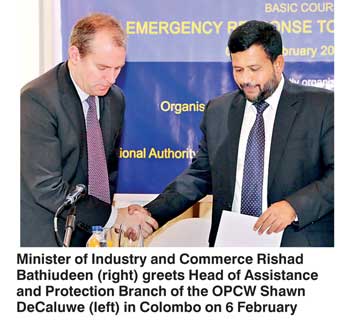Friday Feb 20, 2026
Friday Feb 20, 2026
Tuesday, 7 February 2017 00:00 - - {{hitsCtrl.values.hits}}
Sri Lanka celebrates a historic milestone on the global Chemical Weapons Convention this year – and the first ever international training session to be held in Sri Lanka on emergency chemical incidents has commenced in Colombo on 6 January morning with officials from the Hague specially flying in to run the closed-door proceedings by themselves.
“This year we complete 10 years of implementation of Chemical Weapons Convention provisions in Sri Lanka,” declared Minister of Industry and Commerce Rishad Bathiudeen on 6 February in Colombo. Minister Bathiudeen was addressing the inauguration event of the international training session on Emergency Response to Chemical Incidents conducted in Colombo by the Hague’s Organisation for the Prohibition of Chemical Weapons (OPCW).
Joining Minister Bathiudeen at the event were Head of Assistance and Protection Branch of the OPCW Shawn DeCaluwe with his OPCW experts, chemical experts from the tri-forces of Sri Lanka, Secretary of Ministry of Industry and Commerce Chinthana Lokuhetti. The session is jointly organised by the National Authority of Chemical Weapons Convention in Sri Lanka and the Netherlands based OPCW.
“OPCW provides information on the Chemical Weapons Convention and monitors compliance among the states parties that have ratified the treaty,” said Head of Assistance and Protection Branch of the OPCW Shawn DeCaluwe, and added: “For the first time our Hague office engaged in field operations in Syria as well.”
“This is a special honour for all of us here to take part in this pioneering international training session in Colombo today. I am pleased to say that this event is taking place as we mark a significant milestone in our national chemical program,” said Minister Bathiudeen and added: “This year we complete 10 years of implementation of the Chemical Weapons Convention since its ratification here through an act of parliament in 2007. We now have a proper system of implementing this convention mainly through the National Authority established under my Ministry. I thank OPCW for its continued support extended to Sri Lanka in the formulation and implementation process of this act here. Most of the countries in Asia region do not have the knowledge and skills on response to chemical incidents. The countries are meeting here today in a background of a global shift in use – in that the production of industrial chemicals has been shifting to the developing world, South Asian countries becoming a key player in this sector due to heavy chemical use by them. I am pleased of the good representation of state parties in Asia at this workshop.”
Participants are from India, China, Bahrain, Pakistan, Bangladesh, Bhutan, Korea, Philippines, Mongolia, Myanmar, Maldives, Lebanon, Iran, Iraq, and Sri Lanka. The chemical training session currently taking place in Colombo is the fifth such session conducted anywhere in the world by OPCW – and the first ever to be held in Sri Lanka.